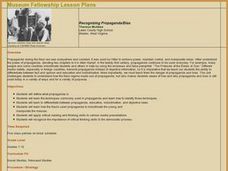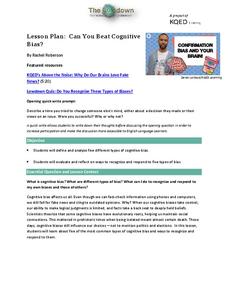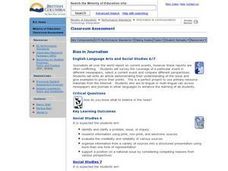iCivics
Propaganda: What’s the Message?
As class members progress through eight fully prepared learning stations, they will identify how bias is present in persuasive media, as well as differentiate among types of propaganda techniques like bandwagon propaganda and the use of...
Media Education Lab
Propaganda in Context
"Board Game Helps Fight Real World Ebola," a video produced by Voice of America, provides the text for a guided instructional activity that asks viewers to analyze the propaganda techniques used in the video. Groups then select a example...
Curated OER
Recognizing Propaganda/Bias
Middle and high schoolers examine the uses of propaganda during the Nazi era. Using examples of propaganda used by Hitler, they discuss how it changed the thinking and ideas of people exposed to it. In groups, they identify how and why...
Media Education Lab
Propaganda Techniques
In an age of fake news, alternative facts, and biased reporting, it is more important than ever that 21st century learners develop the critical-thinking skills necessary to recognize, analyze and resist the propaganda techniques used in...
Facing History and Ourselves
The Nazis in Power: Propaganda and Conformity
The Nazis used the power of propaganda to encourage confirmative views and the discrimination of Jews. A social studies resource illustrates these issues through discussion, image analysis, and a writing exercise.
NPR
Can You Beat Cognitive Bias?
In a time of fake news, media manipulation, and Internet trolls, a resource equips learners with the tools they need to recognize and combat resources that are designed to appeal to our cognitive biases. Introduce learners to five...
Newseum
Weed Out Propaganda
Young scholars study four essential propaganda techniques: Simplification, Exploitation, Exaggeration, and Division (S.E.E.D.). Individuals select an example of propaganda from the past and present then compare how the key elements have...
Prestwick House
Understanding Language: Slant, Spin, and Bias in the News
We live in a time of fake news, alternative realities, and media bias. What could be more timely than an activity that asks class members to research how different sources report the same topic in the news?
Carolina K-12
Propaganda, Spin and Soundbite Politics
It's all about the spin! In an introduction to propaganda techniques and soundbite politics, scholars first learn about common propaganda techniques before seeing them in action in the context of the 2016 election cycle. Activities...
Franklin D. Roosevelt Presidential Library & Museum
The Power of Propaganda in Shaping Civic Actions and Understanding
Propaganda posters are powerful. Using images from The Art of War: American Poster Art 1941-1945 exhibit, young historians analyze the symbols, images, colors, and text used to rally support for World War II. Through seven activities,...
Newseum
Disinformation Nation: Separating Politics and Propaganda
Separating political rhetoric from propaganda is no small feat. Class members are challenged to examine two different sources about a candidate in an upcoming election and determine whether the primary purpose of the source is to inform...
Curated OER
Propaganda: Making a Commercial
Seventh graders study different propaganda techniques. In groups, they write and perform a 60-second TV or radio commercial. Classmates rate the effectiveness of the commercial and whether or not they might buy the product.
Curated OER
Propaganda
How does word choice affect the reading of a text? Compare two headlines that were written about the same event. Is one biased? Discuss how word choice often reveals the author's feelings about a topic. Then look at different techniques...
Curated OER
Understanding Propaganda
Students define propaganda and give examples from the mass media. In this propaganda lesson, students review examples of propaganda and then research versions of it in the mass media.
Curated OER
Media Literacy: Discovering and Understanding Propaganda
Ninth graders study different types of propaganda and select an issue that is significant to them. In this exploratory lesson students design and create posters on the topic of their choice and write a narrative describing it.
Curated OER
Bias, Prejudice and Propaganda
Twelfth graders examine bias, prejudeice, and propaganda in reading selections. They view commercials and print ads, discuss how the advertisers are trying to convince them of something, and keep a commercial journal.
Curated OER
Propaganda During World War I
Eighth graders consider how propaganda was used during World War I. In this World War I lesson plan, 8th graders analyze posters that were used to garner support for World War I. Students use the provided worksheet to analyze the posters.
Curated OER
Dragonwings: Evaluate Chapters 10-12
As your class finishes the novel Dragonwings, use these culminating projects. A vocabulary list is given for chapters eleven and twelve and either an epitaph or letter activity concludes the book. The final project consists of creating a...
Museum of Tolerance
Influence of Media
We are bombarded with media images expressly designed to influence viewers. Learning how to analyze the intended effects of these images is essential and the focus of an activity that asks viewers to use the provided questions to guide...
Middle Tennessee State University
John Brown: Hero or Villain?
"Love it or leave it." "You're either for us or against us." Rhetoric and it's polarizing effects are the focus of a instructional activity that uses John Brown's attack on Harper's Ferry as an exemplar. Groups examine primary source...
Curated OER
Bias in Journalism
Students evaluate the credibility and reliability of various sources. Students survey the coverage of a particular event in different newspapers, select a current event and compare different perspectives. They write an article...
Curated OER
Hidden Persuaders
Students examine classic propaganda techniques to analyze factors which influence learning and thinking processes influencing formation of public opinion through these lessons.
University of Chicago
Addressing Stereotypes
How is a stereotype defined, and what are some mechanisms we can use to combat negative stereotyping? Your young historians will discuss how and why stereotyping occurs, as well as consider the roots of modern conceptions of the Middle...
Roy Rosenzweig Center for History and New Media
Analyzing Political Campaign Commercials
Imagine a lesson that models for learners how to separate facts from opinions. How to detect bias. How to evaluate a source of information. How to identify propaganda. Although designed for middle schoolers, the activities in this packet...
Other popular searches
- Free Bias and Propaganda
- Bias and Propaganda Tactics
- Author's Bias & Propaganda
- Authors Bias & Propaganda
- Propaganda and Bias
- Bias and Propaganda Ww2

























